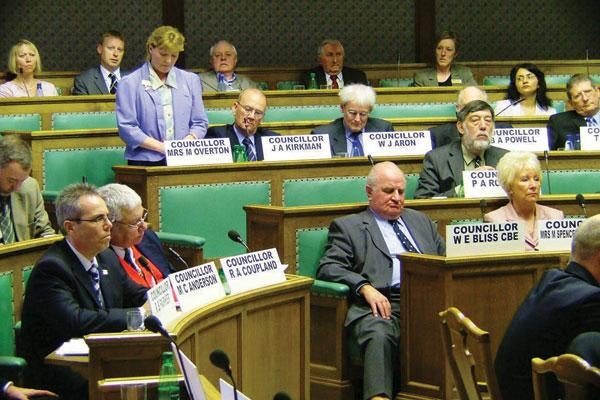
New guidelines aimed at limiting the frequency of local authority-produced newspapers to a maximum of four a year have been passed by Parliament.
The updated code of practice on council publicity comes in light of complaints that council freesheets pose a threat to local and regional newspapers.
The move follows a commitment from Local Government Secretary Eric Pickles to crack down on what he has called “town-hall Pravdas”.
But the Government’s plans were criticised last night by Labour local government spokesman Lord Beecham and Liberal Democrat peers.
Local Government minister Baroness Hanham, introducing the code to the Lords, said it was aimed at addressing the “the problem of unfair competition by taxpayer-funded local authority newspapers”.
She went on: “This competition can have a detrimental effect on commercial and local newspapers.
“Local authority publicity is important but the freedom of the press is also important in providing information for the public to hold their local authority to account.
“It is equally important that readers of a newspaper can tell whether what they are reading is part of the independent press or a publication by the council setting out the council’s message.”
Tory ex-Cabinet minister Lord Fowler, a former journalist, backed the new code, arguing that councils were attempting to take over the role of the press.
The former chairman of Midland Independent Newspapers said: “The role of the local and regional press is to report independently on the news, to owe no obligation to any vested interest, and not to take any line unquestioningly from officialdom.
“They need to be fair and above board and independent in judgment.
“I do not claim for a moment that those values are always maintained, but I do claim that the regional and local press has a proud record in this country of exposing injustice and at times exposing corruption and it is that that is very much in the local public interest.”
He added: “What is happening is that too often councils are trying to take over the role of local independent newspapers without the necessary qualification of independent judgment.
“They are using their local monopoly power to take advertising when they cannot conceivably call that advertising council business.
“They are helping certainly, I think, to drive out of business genuine local papers and they are certainly preventing new independent local papers developing.
“No-one in their right mind would try to take on a monopoly advertiser in their own local area.”
But Lord Beecham, a member of Newcastle City Council for 44 years, pointed to a decline in the quantity of reporting of local authority activities.
The former chairman of the Local Government Association questioned what evidence existed that council papers affected the local press.
“Less than one per cent of councils publish a weekly newsletter, less than three per cent publish a fortnightly and 36 per cent publish quarterly,” he said.
He added: “Decisions on these issues should be made by elected councillors answerable to their electorate.”
Liberal Democrat Baroness Miller of Chilthorne Domer, a former leader of South Somerset District Council, said the major threat to local newspapers came from sources such as the internet rather than council publications.
The “frequency” with which local councils publish newspapers was “not a matter for Government”, she said, adding: “I do hope in this case the Government will think again.”
Fellow Lib Dem Lord Shipley, a Newcastle City Council councillor, added:
“I don’t think it is the business of Government to be legislating on whether a newsletter should be published quarterly or bi-monthly and it just seems to me here we are in very great danger of producing a sledgehammer to crack a nut.”
But Tory Lord Black of Brentwood, executive director of the Telegraph Media Group and a former councillor, backed the code and described independent local newspapers as “the best example we have of localism”.
“If we value a free local press then we have to do everything we can to ensure it operates on a level commercial playing field and it can’t do that if it is competing with local authority publications, not just for readers but for advertising that funds it,” he said.
“Using taxpayers’ money to compete for what is increasingly scarce revenue – and I don’t think any of us should be in any doubt about how difficult the advertising market is – is unfair, anti-competitive and damaging to the local press.”
The Code of Recommended Practice on Local Authority Publicity was agreed by peers without a vote after MPs had earlier accepted it by 297 votes to 187.
Councils are not legally compelled to follow the code – which also contains provisions to stop councils employing lobbyists to attempt to influence MPs or the Government – but breaches can be referred to the district auditor.
Email pged@pressgazette.co.uk to point out mistakes, provide story tips or send in a letter for publication on our "Letters Page" blog
